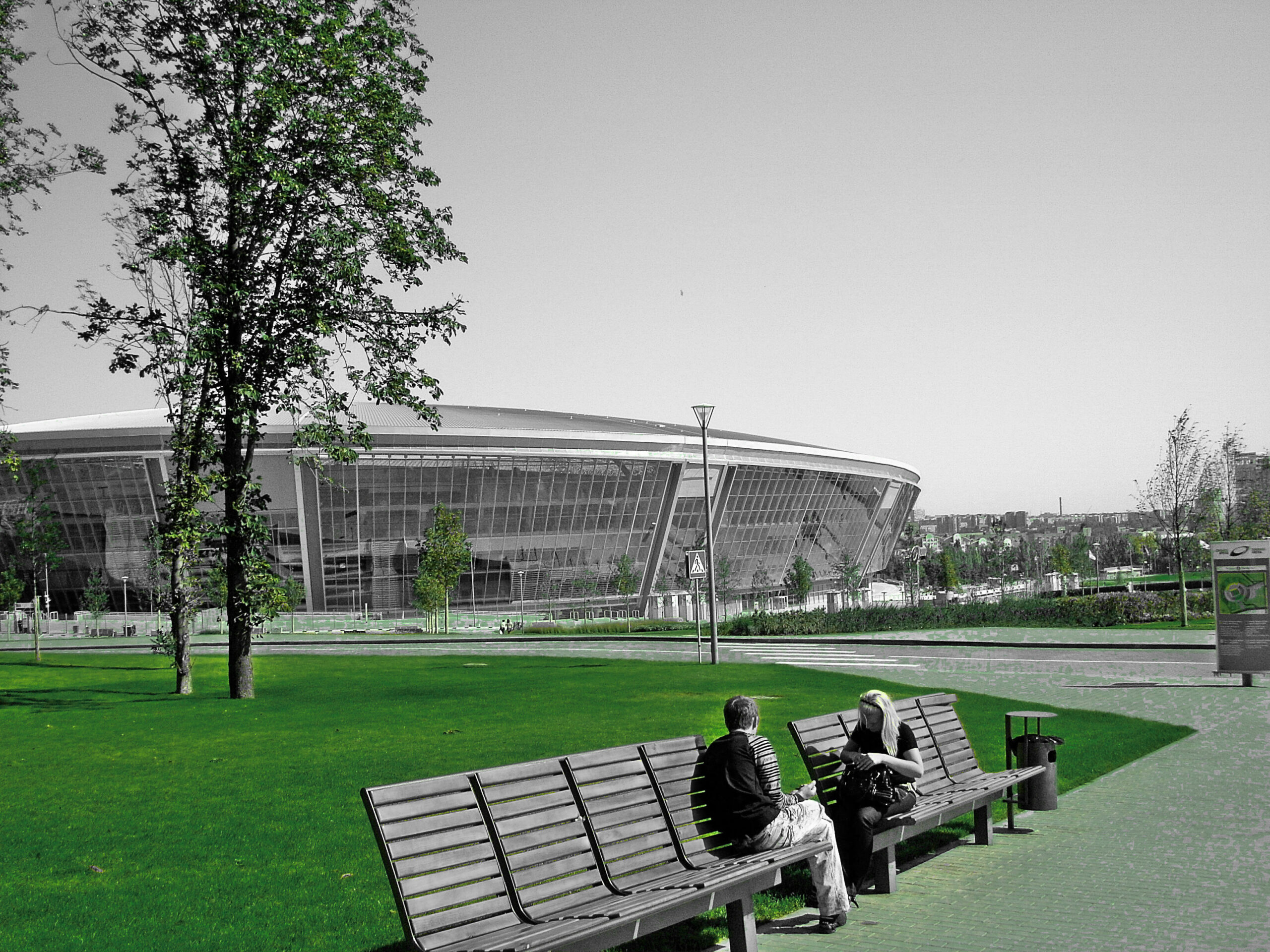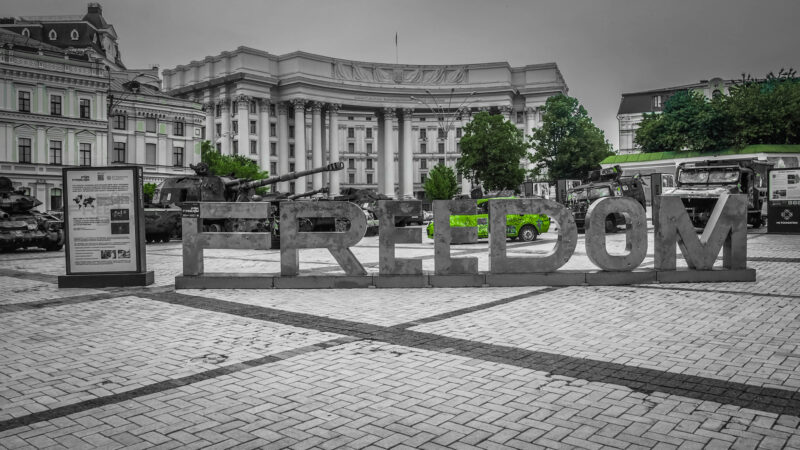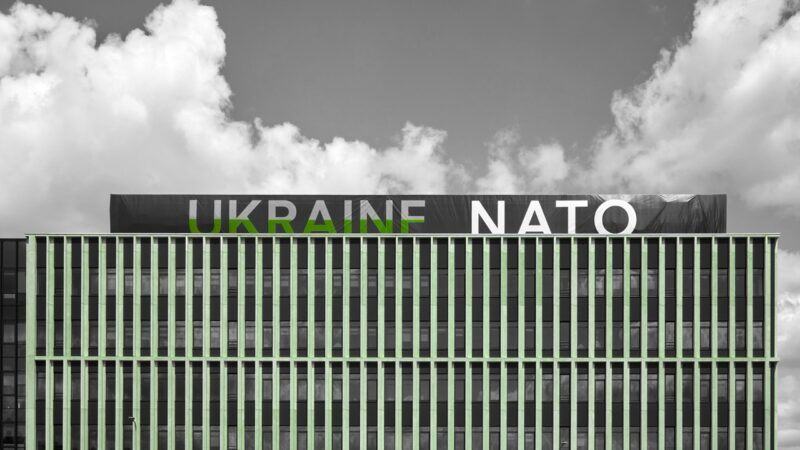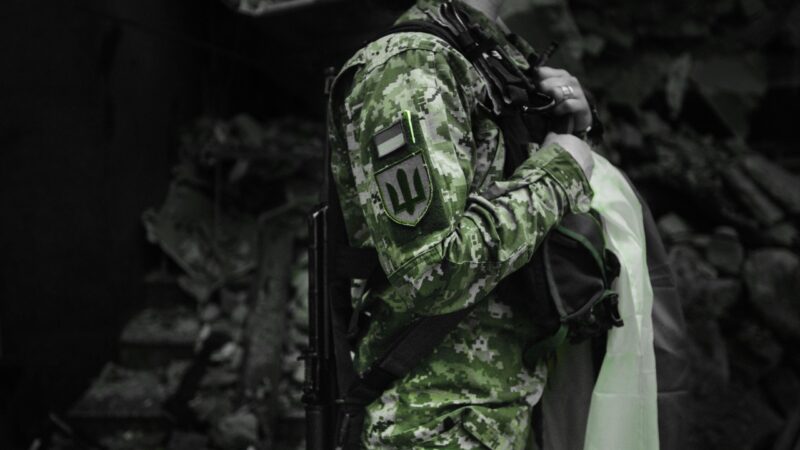“My Ukraine” and “My Street” in the Donbas

Serhiy Zhadan, one of the best known contemporary Ukrainian writers and a native of Starobilsk in the northern Luhansk oblast, stated in 2020 that he prefers to speak of “hearing [the] Donbas” rather than “understanding” the Donbas. Zhadan’s point was that although the Donbas, like any other region of Ukraine, has its own specificity, it has always been Ukrainian ethnic territory and should not be demonized as Ukraine’s “Other.” Of course, we generally seek to listen to others in order to understand them. The problem is that neither listening nor understanding are simple or straightforward. The Donbas region (today’s Luhansk and Donetsk oblasts), an industrial center of coal mining and metallurgy, has a complex history that tends to baffle and challenge outside observers. The war Russia unleashed against Ukraine in 2014 makes Zhadan’s call for hearing the Donbas without prejudice all the more appropriate and timely.
Freedom and “Othering”
Interest in the Donbas heightened during the Orange Revolution of 2004–5. Even though the Donbas had played a critical role in the collapse of the Soviet Union and the independence of Ukraine in 1991, many in Ukraine had come to perceive the Donbas as Kyiv’s ever-angry “problem child,” a constant irritant to the young body politic. For them, the Donbas became a suspect region, prone to blackmailing Kyiv with its formidable economic might. In 2004 the presidential candidate from the Donbas, Viktor Yanukovych, was caught cheating in the run-off election and was forced by mass protests to accept a rematch in which he lost to Viktor Yushchenko. Yanukovych’s evident political ambition, which some observers called a “takeover” of Kyiv by the Donbas political clan, heralded a remarkable departure from the historically rebellious and anti-metropolitan stance that the Donbas had previously assumed. Paradoxically, this “takeover” attempt signalled an important stage in the political integration of this perennially troublesome region into the Ukrainian body politic.
At the same time, however, this stage of seeming integration was deceptive, because behind Yanukovych’s attempt to take over Ukraine’s power stood Russia and its president, Vladimir Putin. The solid support in the Ukrainian east, particularly in the Donbas, for Yanukovych, who had a criminal record, raised suspicion as much as interest. Ukrainian intellectuals were now motivated to better understand the apparent enigma of the people of the Donbas—fellow citizens of independent Ukraine.
Undoubtedly they listened to the people of the Donbas. Yet, as in the past, however sincere they may have been, they were stymied by entrenched assumptions and unable to break free of traditional prejudices. The most notable case concerned Yuri Andrukhovych, a friend of Zhadan’s and, like Zhadan, one of the most prominent writers in today’s Ukraine. In disgust, this respected writer let loose on the Donbas in a respectable intellectual journal, calling the people in the Donbas “medieval-feudal” and “Cro-Magnon-Neanderthals.” This extraordinarily offensive, dehumanizing outburst is merely one typical example of the “othering”of the Donbas among Ukraine’s intellectual community at the time.
Historically speaking, this “othering” of the Donbas is an odd reversal of Ukrainian national myths that idealized the independence, freedom, and democracy of the Ukrainian Cossacks. The Donbas, located as it is on historically Cossack lands, has embodied such myths, providing “freedom” (in the sense of “exit” in Albert Hirschman’s famous concept, i.e. “freedom from”) to whomever wanted or needed it. This has meant that the Donbas has also been ethnically diverse. Moreover, it has been a magnet for all kinds of religious groups seeking a safer haven for their practice (coming to be known as the “Bible Belt” in independent Ukraine). It’s not surprising, then, that the Donbas has maintained an individualistic, self-reliant, and anti-metropolitan streak in its political and cultural fabric. Nor should it be forgotten that pre-revolutionary, industrial development in the Donbas was largely carried out by European and American concerns, which left an indelible legacy—as seen, for example, in Kornii Hrytsiuk’s film YevroDonbas (EuroDonbas, 2022).
The Donbas and its development resemble the development of America. In my earlier work, I concluded that in a sense, the Donbas represents the most “Ukrainian” of all regions in Ukraine (Freedom and Terror in the Donbas (1998), 337.)
The widespread perception of the Donbas as “anti-Ukrainian” is a reflection of the alleged indifference of the Donbas to the Ukrainian state-building enterprise. This is not, in fact, a problem peculiar to the Donbas. The first president of independent Ukraine, Mykhailo Hrushevsky, a populist socialist, was more interested in ensuring the autonomous life of the common people than in state-building. Shortly after the Ukrainian National Republic declared independence in 1918, facing the Bolshevik armed invasion and with no military forces to speak of, Hrushevsky resorted to inviting Austrian forces to protect Ukraine’s independence but failed to retain power. In the wake of this bitter historical lesson, the task of state-building became all-important in newly independent Ukraine after 1991. The discontented and anti-metropolitan Donbas appeared to impede this goal.
Although he was clearly Putin’s political plaything, Yanukovych possessed an independent streak. In 2003, at the time of the Tuzla Island border conflict with Russia, Moscow tried to have its way in negotiations with Yanukovych (then Ukraine’s prime minister under President Leonid Kuchma). When Moscow demanded the removal of Ukrainian armed forces from the border zone near Tuzla, Yanukovych responded by saying that Ukraine as a sovereign state had the right to deploy its forces on its territory as it saw fit (testimony of Leonid Osavoliuk). Once elected president in 2010, he was in no hurry to pursue Putin’s agenda in Ukraine: the federalization of the country, elevation of Russian to the status of second official language, and closer political, economic, and cultural integration into the Russian world. This provoked Putin’s decisive intervention in November 2013, which led to the Revolution of Dignity (aka Euromaidan) in Ukraine. Against Putin’s advice, Yanukovych fled from Kyiv in February 2014—to save his life, not Ukraine. His flight immediately set off Putin’s covert military invasion of Ukraine. In the process, large sections of the Donbas fell into Russian hands in the guise of the Donetsk and Luhansk “People’s Republics.”
Although there were pro-Russian people in the Donbas, there were no separatist movements to speak of. In the spring of 2014 no desire for Russia’s military intervention, let alone occupation, existed. Russian agents, secret operatives, and disinformation created a picture of the Donbas (and eastern and southern Ukraine) in civil war. The Donbas residents themselves were surprised that war broke out at all in their land, considering it simply absurd.
Russia’s operations did create room for opportunists like Oleksandr Zakharchenko, who became prime minister of the Donetsk People’s Republic in 2014. As late as 2012, the Spanish journalist Pilar Bonet had observed him at a game of the 2012 European Football Championship held in Donetsk, waving the Ukrainian national flag and cheering with cries, “Ukraine! Ukraine!”
Unfortunately, some Ukrainian intellectuals fell for Russia’s political ruse. For example, Taras Prohasko, another prominent Ukrainian writer, wrote in the spring of 2014 that he had no desire to fight to recover the Donbas from hostile enemy forces, because the people of the Donbas were “completely different” from “us” (western Ukrainians). Undoubtedly Moscow was happy to hear this sort of defeatist sentiment. Prohasko’s case is revealing, because he is well aware that the Donbas embodies Ukraine’s national myths of the Cossacks. In an essay about the Donbas Sich that he published a year later, Prokhasko discusses his father’s post–WW II exile in Chita, Russia, depicting it as a land far from Russia’s power centre, unsafe but “free” (vil’ne), and reminded him of the Cossacks he had read about in children’s books. When his father finished schooling back in Galicia, he was recruited to go to the Donbas, where he dreamed of enjoying a free, self-reliant life. His father’s mother, however, became worried about his departure for the Donbas and convinced him to delay his “flight to freedom” (vtecha do svobody) by arranging for him to study in Drohobych. In discussing his father’s story, Prokhasko explicitly states that the Donbas is “today’s embodiment of the old Sich,” where something deeply connected to Cossack identity actually exists. He suggests that Ukrainian statehood may have again become the victim of its own most heroic myths. It is a matter of a painful choice, Prokhasko concludes, between the “ideals of freedom as a conscious necessity” and “the dangerous and senseless Cossack freedom/will” (vybyraty mizh idealamy svobody iak usvidomlenoї neobkhidnosti i nebezpechnoї ta bezhluzdoї kozatskoї voli).
Certainly, Cossack freedom was not necessarily dangerous or senseless. It did involve the freedom to form tactical and temporary alliances with outside forces, in order to safeguard independence and freedom. In fact, such an alliance with Muscovy is what doomed Cossack independence in the seventeenth century. Was that loss due to “Cossack freedom” that was “dangerous and senseless”? It is doubtful. We should not underestimate Muscovy’s use of autocratic power and political ruse. Moreover, does today’s Donbas embody such “dangerous and senseless Cossack freedom”? Also, doubtful. Consider Russia’s covert operations that preceded the occupation of the Donbas. Prokhasko’s point seems to be that today’s Ukrainian statehood, endangered by Russia, is the best guarantor of the ideals of freedom as a conscious necessity, and that criticism of the Ukrainian government undermines Ukrainian statehood in the name of freedom. This is a veiled criticism of the so-called “Donbas separatism,” which really did not exist as a political movement before Russia’s intervention.
Criticism of the Ukrainian government was not a right claimed by the Donbas for itself. Rather, criticism is part of what Prokhasko has called “freedom as a conscious necessity,” a freedom every region and every citizen of Ukraine enjoys (and should enjoy). Moreover, there were no alliances between the Donbas and Russia in 2014. It was outside forces (Russia) that penetrated the Donbas and feigned an “alliance” with the Donbas.
Freedom and Vulnerability
The Russian occupation of the Donbas was largely accidental and not predetermined by any alleged pro-Russian sentiment. Moscow’s main aim in 2014 was the occupation of southeastern Ukraine, from Kharkiv to Dnipro and to Odesa. The Donbas, a perennial troublemaker, was not a priority. When Moscow failed to achieve its goal, it seized the Donbas as a sort of “consolation prize.”
Yet in one critical respect, the Donbas may have unintentionally invited occupation by Russia. The Donbas has always been a place where anyone could build a life anew. By its nature, then, it attracted all kinds of dubious characters such as Russian nationalists, neo-Nazis, neo-Stalinists, and political schemers and plotters, as well as “riff-raff” and criminals of all stripes. These people generally avoided Kyiv and Kharkiv. They found their niche undisturbed in the Donbas. Some of them were Russian secret operatives, who sought in the Donbas fertile ground for recruitment. The Donbas thus might be said to have facilitated Russia’s transnational provocation. It fell victim to its own reputation as a land of freedom. If so, should this freedom be labeled as “dangerous and senseless”? In fact, what took place is not unique to the Donbas. It is rather a problem of what Prokhasko calls “freedom as a conscious necessity.” Democratic states that safeguard civil liberty face the same problem of how to deal with subversive political forces of both left and right without violating civil liberty. Russia, China, and other states adroitly exploit this problem to destabilize democratic countries.
Prokhasko’s anger at the Donbas has much more to do with its alleged indifference to the fate of Ukrainian statehood than with its “dangerous and senseless freedom.” As discussed earlier, freedom for the Donbas always meant “negative freedom.” Ukraine’s independence certainly signified liberation from Russia. Yet many residents of the Donbas were wary of the post-independence political and economic turmoil, which often turned violent and even murderous. Some turned to cynicism as one way to deal with it. They voted for Yanukovych, aware that he was a “thief from Ienakiievo” and the “shame of the Donbas,” because he was, nevertheless, “our bandit.”
Others rejected politics altogether. Disengagement from cantankerous, chaotic, and corrupt politics was a way to ensure an internal space of freedom and security. Zhadan has addressed this question openly. He summarizes the peculiarity of the people of the Donbas and the Ukrainian east when he notes that the Galicians say “my Ukraine,” while “easterners” (by which Zhadan refers largely to the people in the Donbas) say “my street” (see Oleksandr Mykhed, “Ia zmishaiu tvoiu krov iz vuhilliam”: Zrozumity ukrains’kyi Skhid [Kyiv, 2020], 204). Of course, the Galicians do not live by “my Ukraine” alone. They also speak of their streets, their homes, and the like, just as the easterners sometimes speak of their country (Ukraine). Zhadan’s point is that easterners tend to be focused on their daily lives and avoid speaking of bigger issues such as national politics. It is not that easterners are entirely apolitical. When they have to make choices, as they did in 1991, they overwhelmingly supported Ukraine’s independence. And yet, twenty-three years later, in 2014 when the existence of independent Ukraine was threatened by a covert military invasion by Russia, they found themselves accused of supporting Russia.
This accusation is unwarranted, as argued earlier. Zhadan knows it too well. In the years of post-1991 difficulties, his own parents idealized the “good old” happy Soviet era with nostalgia. His father, who was a passive member of the Communist Party during the Soviet era, did not take well to the Euromaidan, although he was not a fanatic supporter of Yanukovych, either. Yet when the war began in 2014 in the Donbas, he said, “The Muscovites [katsapy] have attacked us” (Mykhed, 203). Zhadan’s point is that the narrow focus on one’s own daily life (patriotism of “my street”) played a cruel joke on the people of the Donbas, many of whom ended up losing their towns, streets, and homes. It was Russia’s military invasion that deprived the people of the Donbas of the right to make a choice of their own. Although they were victims, Zhadan does not lightly absolve them of their failure to stop Russia’s subversion. In his view, the only hope to save Ukraine and the Donbas is for people to re-discover their Ukrainianness (ukraїnstvo). As his parents’ case shows, many in the Donbas never lost their sense of being Ukrainian.
In his novel Internat (The orphanage; 2017), Zhadan explores the problem of “my street” in the Donbas. Its protagonist, Pasha, a teacher of Ukrainian language in a Donbas town, is indifferent to national politics, He is neither for nor against any political party. He never votes. He is also indifferent to the war that breaks out in the Donbas in 2014—it is someone else’s war. Instead he is focused on teaching his students. Yet the war inevitably ensnares him in situations that force him to make certain decisions and take responsibility for them.
It is hard to argue with Zhadan’s characterization of the people in the Donbas and his prescription to deal with the parochial patriotism of “my street”: “Become responsible Ukrainian citizens.”
Like Zhadan, the young Ukrainian writer Oleksandr Mykhed has also listened to many people in the Donbas, and he has reached a conclusion more pessimistic than Zhadan’s (Mykhed, 2020). Without “othering” the Donbas, he attempts to understand the people by speaking with individuals in the region, including such well-known individuals as Zhadan, Ihor Kozlovskyi, Alevtyna Kakhidze, Roman Minin, Olena Stiazhkina, and Volodymyr Rafeienko. Even though the views offered by the people he has interviewed should presumably have given him a different view, he seems to have fallen into ingrained prejudices about the Donbas, which he sees as empty of history and culturally bankrupt, a land of imitation (simulacre).
Mykhed understands that the Donbas, like any other region, is diverse and complex, and challenges an easy generalization. All the same, he sees a common feature there—irresistible nostalgia for the “good old” Soviet era. Mykhed believes that what happened in the Donbas (i.e., the Russian occupation) could happen any place where people demand simple answers to complex problems: such people can be easily manipulated. Mykhed thus seems to imply that the people of the Donbas as a whole saw a simple answer, the resurrection of the Soviet Union, to their plight, thus opening themselves up to Russian manipulation. Here, one has to question whether the people of the Donbas actually believed it possible to return to the old Soviet era. Their professed nostalgia seems rather an expression of their despair and a silent protest against the economic and political mess they saw in Ukraine. There is no indication that they envisaged their future outside an independent Ukraine. Mykhed admits honestly that he may not have properly heard and understood the Donbas, and if so he will apologize. He understands that “my inner demons” (by which he seems to refer to his own prejudices) will be punished. Indeed, he has been severely criticized by Ukrainian readers. Yet his book concludes on an optimistic note for the future of the Donbas, which seems incongruous with his general pessimism.
Mykhed’s point on the danger of people searching for simple answers to complex questions is not peculiar to the Donbas. In 2016, the United States, which prides itself on being the global leader of freedom and democracy, proved vulnerable to domestic and external (Russian) political demagoguery and manipulation, electing as President a candidate fundamentally opposed to democracy, freedom, science, and the rule of law.
Conclusion
Zhadan’s premise of “my street” patriotism poses fundamental questions regarding relations between individuals and their polity. “Freedom from” ensures neither security nor free human existence, as Timothy Snyder reminds us in his recent book On Freedom (2024). Humans are not isolated beings, and every human, even a hermit, lives in some kind of polity. Disengagement from that polity will endanger not only “my Ukraine” but also “my street.” At a time of foreign aggression and war “my Ukraine” is absolutely necessary for survival. At the same time, disengagement from “my street” can also be dangerous. Those who have experienced Communist rule or other dictatorial rule that emphasizes “my country” at the cost of “my street” know well how dangerous it can be. Absorption in “my country” creates a world of notional abstraction devoid of care and concern about the individual. The Bolsheviks emphasized “consciousness” against “spontaneity”: Communism above all and to hell with “my street” or “pobut/byt” (prosaic everyday life). The title of Mykhed’s book “Ia zmishaiu tvoiu krov iz vuhilliam” (“I’ll mix your blood with coal[dust]”) is revealing in this regard. It is taken from the threat the party boss in Donetsk (concerned only about “my Donets’k,” “my party,” and “my country”) made against Aleksei Nikitin, a mining engineer who complained about the inadequate safety measures in the Donbas mines. This was in the late Brezhnev era. Nikitin was confined to a psychiatric hospital and died in 1984.
It is easy to condemn Communist arrogance and self-righteousness (“conscience”). Yet the question of “my Ukraine” and “my street” is integral to everyone’s life. As I recall, it was Elena Bonner, Andrei Sakharov’s wife, who once spoke ironically of her feelings about politically “conscious” men: they passionately and grandiosely discuss, for example, how to feed hungry children in the world, but they are largely incapable of waking up in time to feed and send their own children to school. One can sympathize more readily with women looking after their children’s everyday lives than with the men for whom it is of lesser concern than world affairs.
Although “my Ukraine” and “my street” are not mutually exclusive concerns, they demand a constant readjustment in commitment. The Donbas may appear puzzling or infuriating to outsiders, but it poses, in a sharpened focus, critical questions of human existence in a given polity. The recent Ukrainian literature on the Donbas demonstrates how important the Donbas remains to both Ukraine’s intellectual life and Ukraine’s existence as a sovereign state.
I am grateful to the participants at the Ukrainian History Global Initiative conference held in Kyiv in September 2024 for inspiring this essay and to my friends from the Donbas for fruitful discussions
of their homeland.




